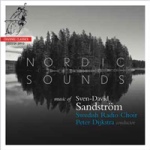Channel Classics has taken a turn into new territory with this release of sacred choral works by contemporary Swedish composer Sven-David Sandström–and it turns out to be one of the label’s most engaging, enlightening–and exciting–discs of the year. When we last encountered this composer it concerned his new musical setting of the libretto of Handel’s Messiah (type Q12843 in Search Reviews)–a recasting of Jennens’ text that I found neither cohesive nor necessary. Here Sandström is shown in his element as a truly competent, original composer uninhibited by conventional views on what singers can or can’t do. Of course, when you have a virtuoso ensemble like the Swedish Radio Choir performing your music, what’s to worry? Clearly, this choir can sing anything, and make it sound like real music!
Fortunately, the music here is not just “anything”, but consists of seriously substantial, challenging, and relentlessly compelling works covering 28 years of Sandström’s career, right up to the gorgeous A New Song of Love–a 2009 setting of the oft-treated “Rise up my love” text from the Song of Songs. Some of Sandström’s choral pieces have appeared before on programs with other music–the Agnus Dei, by the Dale Warland Singers (D’note), and Hear my prayer and Es ist genug, by the Estonian Philharmonic Chamber Choir (Harmonia Mundi)–but this dedicated program stands as the place to go not only for an authoritative overview of the composer’s work, but also as a measure of the highest standard of modern choral composition and performance.
No one will say that this is an easy listen–indeed it challenges our traditional expectations of what a choral concert is about. But that’s a good thing. We can listen to the traditional stuff anywhere, anytime, in performances by dozens–hundreds–of choirs. Here we’re confronted with music that doesn’t fit any regular form, yet faithfully follows time-honored biblical texts, from the Psalms to the Mass to the above-mentioned Song of Songs.
Bach figures into the mix, with two settings based on motets he composed for double choir–Lobet den Herrn and Singet dem Herrn. In the first of these, which opens the disc, we hear what amounts to a sort of hyper-syncopation among the voices on the word “Lobet”–the sound reminiscent of when we used to tape a musical excerpt and then play it backward, placing the attack last and the decay first. This is essentially what the singers do here with pure vocal technique–and it’s not only unusual but a bit disorienting. But the music expands and unfolds and changes in a way that keeps us surprised and interested, and looking for more!
Sandström seems to have realized that tight note-clusters and open-voiced chords, while making for delightful and desirable choral sound, have been done by just about everybody. And while he freely employs these devices, he plugs them into some rather extreme rhythmic configurations that often combine with sudden shifts of tempo and join with one of his trademark techniques–repetitive, overlapping little melodic cells that owes much to minimalist practice.
In other hands these deliberate, calculated effects might sound, well, affected and calculated–but Sandström only uses them as a means to create a grander if less predictable whole that can leave you both questioning and elated with the exhilaration of discovery. If you don’t have a clue what I’m talking about, just listen to the astonishing Agnus Dei, certainly one of the late-20th-century’s more evocative musical conceptions based on this ancient text (it apparently created quite a stir at its premiere in 1981). The tone clusters and dynamic extremes are here, along with the jazzy, slow-moving harmonies–but as modern settings of this text go, I’ll take this version, intensely, passionately sung by these Swedish singers, anytime. And that final chord, six and a half minutes in, is worth waiting for, one of the more satisfying conclusions to a piece that you’ll ever hear.
Although there are many moments that will stretch the familiar boundaries of comfort for a casual listener, there’s nothing here that’s gratuituously irritating, and there are some pieces–Es ist genug; A new song of love; Agnus Dei–that will literally prime you with the familiar while launching you headlong into the experience of choral music’s newest frontier. Sandström writes with an assured understanding of voices (he’s also a prolific composer of pieces for various instruments and instrumental configurations), and while his works are for the most part extremely challenging, both for listeners and performers, the musical language is fresh and vital and perfectly suited to the medium.
I can’t listen to a program like this all at once–but I’m invariably rewarded by whatever selective listening I choose, and I have to say that the Agnus Dei and A new song of love seem to always find their way to the top of the list. Channel Classics has found a perfect partner with the Swedish Radio Choir (its new conductor, Peter Dijkstra, was formerly director of The Gents, a frequent presence on Channel Classics recordings), and I hope that the relationship continues.
































